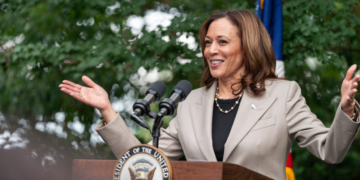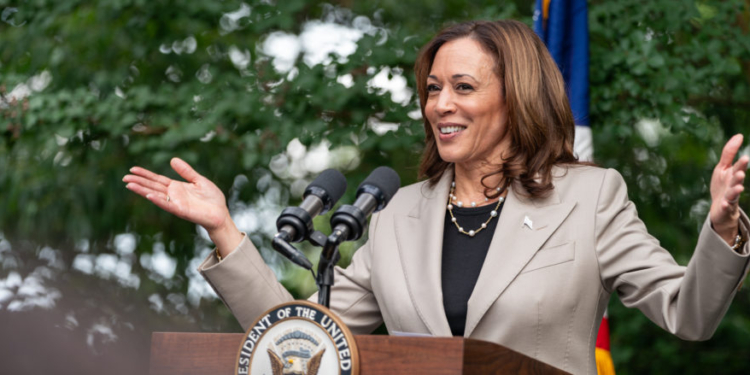Vice President Kamala Harris recently rolled out a proposal to tackle food prices, framing it as a response to “price gouging” by grocery stores and producers. This proposal is not just flawed, it is a classic example of overreach by the left that seems more interested in expanding bureaucratic control than addressing the real issues.
Harris’ plan to implement price controls not only reveals a fundamental misunderstanding of economic principles but will intensify the financial strain on American families, driving the final nail into the coffin of the Biden-Harris administration’s failed economy.
The left claims that grocery stores are deliberately keeping prices high to pad their profits. I have had the privilege of working with all types of grocers throughout my career – from the largest corporate chains to small, family-owned businesses. I know price gouging is not what is driving the rise in food costs. Prices are set based on a complex mix of factors, including supply chain disruptions, labor costs and market demand — elements that the government cannot and should not control. This industry operates on razor-thin profit margins, and the spike in prices is a direct result of the Biden-Harris administration’s disastrous policies, which have affected supply chains and fueled inflation, making it harder for grocers to keep costs down for American families.
Rather than acknowledging the role their own economic mismanagement has played in driving up costs, they are scapegoating businesses that are simply trying to navigate a challenging market environment.
The idea of enacting a federal ban on price gouging may sound appealing to some, but it is actually gaslighting that will lead to unintended consequences, like food shortages. Rather than making things better for consumers, this plan would force companies to reduce supply or withdraw from certain markets altogether to avoid punitive actions by the federal government. Harris’ proposal risks creating more problems than it solves, potentially making grocery bills even higher for the very families she claims to be helping.
History shows that such controls do not work. Unable to cover the costs, producers may reduce production or close entirely. The inevitable result is empty shelves, long lines and even black markets for necessities – a scenario that has played out in many countries that have attempted similar policies.
Take Venezuela, for example. Once the wealthiest nation in Latin America, it is now a shadow of its former self, devastated by socialist policies like price controls. The government’s attempts to cap food prices led to severe shortages, driving millions to flee the country in search of necessities. Similarly, Argentina’s experience with price controls has resulted in rampant inflation and a thriving black market. Harris is willing to risk dragging America down this same dangerous path.
But the proposal isn’t just economically disastrous – it is an affront to American values. The United States was built on the principles of free markets and individual liberty. This plan would place control over what Americans can buy and at what price in the hands of government bureaucrats, which is a step more in line with authoritarian regimes than with the American way of life.
Moreover, this initiative would hit small businesses and farmers — especially in Hispanic communities — particularly hard. These small, family-owned grocery stores and local farmers, already operating on razor-thin margins, would be forced to sell at a loss under price controls, pushing many out of business. The result? Large multinational corporations would dominate the market, further eroding the local economies that are the backbone of our nation.
We must also consider the effect on food quality. Government-set prices give producers little incentive to maintain high standards, leading to a decline in quality. In places like Panama and Puerto Rico, price controls have led to an influx of low-quality imports, driving local producers out of business and reducing the quality of available food. If this plan is implemented, Americans could face the choice between low-quality, mass-produced goods and nothing at all.
Kamala Harris’ proposal is not a solution — it is a smokescreen designed to distract from the real causes of rising prices. The proposal faced significant backlash as soon as she announced it. It was also notably absent from her speech at the Democratic National Convention, which raises questions about the viability and public support for her plans. It is a dangerous step toward economic ruin and a direct assault on the freedoms that define our nation.
Instead of more government intervention, American families need a return to America First policies that promote economic growth, competition and innovation – principles that have always been at the heart of a strong, prosperous America. We must unleash American energy to bring down production and transportation costs, cut regulations so people can run their businesses more effectively, and reduce federal spending.
The American people, especially the hardworking Hispanic community, deserve better than to be pawns in the progressive agenda. It is time to resist this attack on our economy, defend the values that have made our country strong and protect the principles that make America great.
Bob Unanue serves as a board member for the America First Policy Institute and chairman of the Hispanic Leadership Coalition. He is the President and Chief Executive Officer of Goya Foods and Goya Cares and served as the executive producer of the movie Sound of Freedom.
The views and opinions expressed in this commentary are those of the author and do not reflect the official position of the Daily Caller News Foundation.
Featured Image: Official White House Photo by Polly Irungu
All content created by the Daily Caller News Foundation, an independent and nonpartisan newswire service, is available without charge to any legitimate news publisher that can provide a large audience. All republished articles must include our logo, our reporter’s byline and their DCNF affiliation. For any questions about our guidelines or partnering with us, please contact [email protected].



























 Continue with Google
Continue with Google